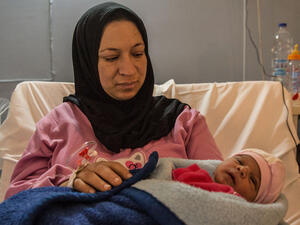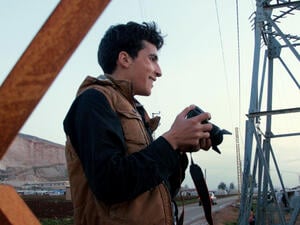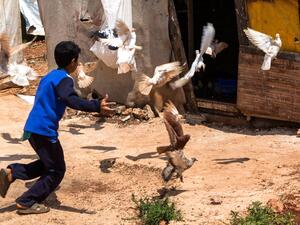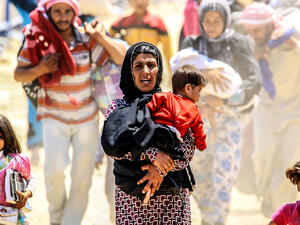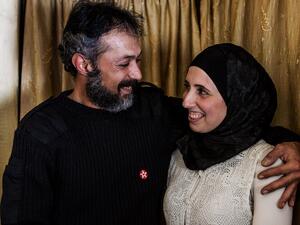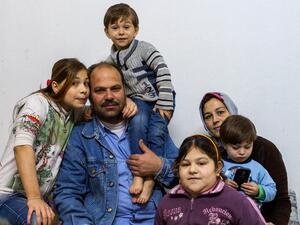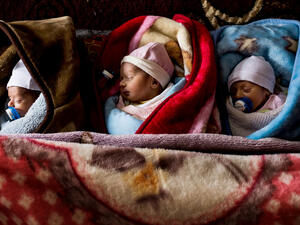With most Lebanese back, UNHCR shifts focus to the rebuilding
With most Lebanese back, UNHCR shifts focus to the rebuilding

Many displaced Lebanese have been returning to scenes of destruction in their home villages. Bent Jbail, a focus of the recent fighting, was very badly damaged.
YABOOS BORDER CROSSING, Syria, August 18 (UNHCR) - The number of Lebanese crossing from Syria fell sharply on Friday, indicating most have returned, and the UN refugee agency shifted its focus to assisting the returning Lebanese to recover from the destruction of a month-long war.
The return of nearly 10,000 Lebanese through the four monitored border points by four in the afternoon brought the total recorded returns to some 117,000 since a ceasefire took effect on Monday morning. Thousands more were believed to have returned by unofficial routes.
At Yaboos crossing, on the main Beirut-Damascus highway, less than 7,000 Lebanese had crossed by the late afternoon, compared to 75,000 in the previous four days. Syrian officials described the flow as virtually normal for the key border point.
UNHCR continued to organise buses from Syria for those needing assistance to return, but only four buses were used on Friday - well down on previous days. UNHCR also ran a shuttle bus the four kilometres between the border posts to transport those who had to walk across no-man's land, but again the numbers had dwindled.
"We are going back to Baalbek," a family in a private car told UNHCR border monitors. "We don't know what is waiting for us there, whether our house is still intact or not. But we want to go and see.... We're going to rebuild whatever needs to be rebuilt."
The number of Lebanese who sheltered in Syria was estimated to have reached 180,000, but collective centres are now nearly empty. However, UNHCR believes some Lebanese refugees might have stayed behind with host families or in other accommodation and will carry out a survey to see who needs assistance.
With the return of most Lebanese who had been displaced, inside and outside their country, UNHCR's emphasis has shifted toward the immediate needs of returnees and helping those in rural areas to rebuild. Initially, UNHCR will focus on emergency shelter in rural areas such as tents and basic structures that can later be expanded.
"Their house has been hit by a bomb," said a driver at Yaboos who was carrying relatives to Beirut. "There is nothing left. My relatives will live with us until their place is fixed again," he continued. "They had a house, south of Beirut, five rooms. It will take us maybe two months to rebuild it."
UNHCR staff were in the southern city of Tyre, helping to assess the needs in the worst hit area in Lebanon and establishing a forward distribution base for relief supplies, including mattresses, plastic sheeting and other essentials for families that had lost everything in the bombing.
One protection officer said most southern towns were deserted, though some people - mainly men - were returning to assess the damage. Lack of electricity, fuel, water and food made it difficult for people to live in the villages. "Everything is destroyed and the shops are closed or empty. They want food, water, clothes and shelter. And most of all, they want to feel safe again," he said.
The town of Aita ech Chaab overlooking the Lebanon-Israel border is typical. Before the conflict it had a population of 15,000 and 1,300 houses. Today, only 100 houses are still standing - the rest have been destroyed or are too badly damaged to be lived in. The town is full of huge craters and rubble, yet residents have started to return and sleep in damaged buildings or courtyards.
Many bodies lie under the rubble and returnees were on Friday burying 17 residents killed during the conflict. UNHCR plans to truck in blankets, mattresses and kitchen sets and other agencies are going to help with food and water. The danger of fresh hostilities and the presence of mines and unexploded ordnance makes aid work more difficult.
Meanwhile, UNHCR, which is the lead UN agency for emergency shelter, will participate in a five-day survey of the damage led by the Lebanese government. It will begin its work in southern Lebanon on the weekend.
UNHCR continues to bring in supplies that will be needed by returnees in the coming months. Two more C-130 flights provided by the Belgian air force carried UNHCR supplies to Beirut from Amman, delivering 335 plastic sheets, 201 tents and two armoured vehicles. The vehicles are needed to safely move staff onto roads in southern Lebanon.
The Portuguese air force will join the airlift on the weekend. And large quantities of UNHCR supplies are beginning to arrive by sea, with the unloading on Friday of a French ship that delivered five trucks for UNHCR plus 3,000 kitchen sets and 15,000 jerry cans. Another ship with supplies is expected to dock on Monday.

